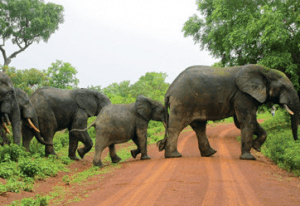Elephant poaching fueled by China costing African countries $25m in tourism revenue – Study
 The surge in elephant poaching fueled by high demand for ivory by China and Asia is costing African countries revenue loses in tourism estimated at $25 million a year, according to a new study.
The surge in elephant poaching fueled by high demand for ivory by China and Asia is costing African countries revenue loses in tourism estimated at $25 million a year, according to a new study.
The study by scientists from World Wide Fund (WWF), the University of Vermont, and the University of Cambridge, the first continent-wide assessment of the financial losses that the current elephant poaching surge is inflicting on nature-based tourism economies, found that in east, southern, and west Africa, investing in elephant conservation brings economic gains similar to investments in education.
The study however, found that in the forested and remote countries of central Africa that do not draw as many tourists; elephants in these places are harder to spot and the protected areas are more difficult to get to, and therefore, they do not suffer the same situation.
The study notes that every year, poachers kill between 20,000 and 30,000 African elephants for the illegal ivory trade, funded by global organized crime syndicates and fueled largely by demand in China and other parts of Asia.
“In just the past 10 years, Africa’s elephant population has declined by more than 20 per cent,” it said.
The scientists found that in the Selous Game Reserve, Tanzania’s largest protected area, rampant ivory poaching has seen the population of elephants reduced by 90 per cent in less than 40 years. Nearly 110,000 elephants once roamed the savannahs, wetlands and forests of Selous, but now only about 15,000 remain in the ecosystem, it says.
The crime of trafficking in wildlife in general is not only posing threats to wild fauna and floral, but it has also become a major source of illicit finance across the world, a forthcoming report by the Global Financial Integrity shows.
According to the report, to be released this November 2016, an estimated $5 to $23 billion is generated every year from the illegal trade in wildlife.
A 2012 report by the WWF, which noted that the illegal wildlife trade is a threat to national security, estimated that $19 billion a year is generated from the crime.
By Emmanuel K. Dogbevi
